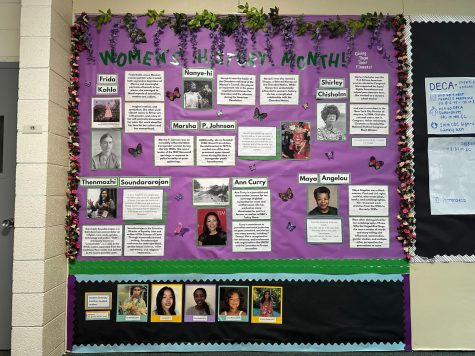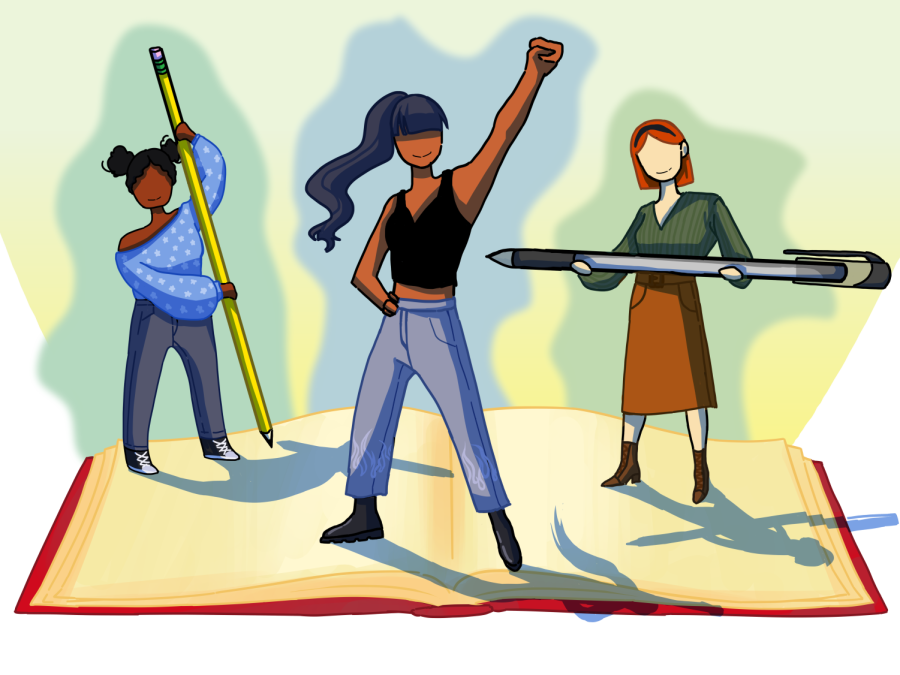“We can still do better:” honor her-story
Women’s History Month serves as one way students and faculty can celebrate women’s many contributions to modern society and recognize their erasure throughout history. “It’s a chance to pause and reflect on the fact we need a separate category of history for half the population of the world,” FEM Club Advisor Donna Gilbert said.
March 16, 2023
Amongst the many boards along the colorful walls of Main Hall, one in particular stands out. Adorned with flowers, a purple and green board shows the faces of various influential figures from our past. Nanye-hi, a Cherokee leader who served as a key diplomat between colonists and the Cherokee Nation during the American Revolution. Shirley Chisholm, the first Black woman in Congress; a major advocate for unilateral access to abortion. These women have shaped the world we live in today. Yet somehow, their names seem almost alien to an uninformed viewer.
We did not merely forget who they were. We never bothered to remember them in the first place.
Women’s History Month serves as one way students and faculty can celebrate women’s many contributions to modern society and recognize their erasure throughout history. And despite the steps Harker takes towards rectifying these injustices, many community members believe there’s still more work to be done.
In 1978, Northern California school districts began to organize a Women’s History Week around International Women’s Day on March 8. Activists and legislators soon pushed to expand the celebration to an annual event lasting throughout the month of March. By the mid 1980s, the U.S. government began declaring March of each year to be Women’s History Month. Today, citizens from the U.S., United Kingdom and Australia all recognize the month as a time to commemorate women’s achievements throughout history, many of which have traditionally been overlooked.
FEM Club, which discusses female empowerment issues through frequent roundtable discussions and events, believes that Women’s History Month is a way of honoring and bringing attention to women’s past and current efforts to attain gender equality.
“It’s a chance to pause and reflect on the fact we need a separate category of history for half the population of the world,” FEM Club advisor Donna Gilbert said. “Women have struggled to gain socio-political equality and rights over the years, and it’s not just in the United States. It’s been a global phenomenon.”
In a roundtable discussion, FEM Club President Carol Wininger (12) and officers Deeya Viradia (12), Divya Shivakumar (12) and Athena Wu (12) discussed the implications of reserving a month specifically to recognize women’s history, especially for historically disadvantaged communities often hidden under the umbrella of womanhood.
“I think it’s very important to set aside specific times of the year where you learn about and highlight marginalized groups,” Carol said. “And feminism is intersectional, so I think including intersections between women and other marginalized groups is important.”
Especially in the context of the continued present-day debates over women’s rights, such as the overturn of the Supreme Court’s landmark Roe v. Wade decision last summer, Athena believes Women’s History Month serves as a valuable tool for bringing women’s rights issues to the attention of future generations of leaders.
“Looking decades into the future as younger people begin to take more positions in politics, my hope is that people are more aware [of these issues],” Athena said. “And [I hope] more women have the positions of power needed to be making decisions regarding things like abortion and Planned Parenthood.”
The officers also discussed the ways Women’s History Month can still have an impact within Harker, where community members often make an effort to ensure equal opportunities for all genders.
“There are still many problems even at Harker with regards to women not being always listened to,” Divya said. “It might be better than a few other places, but there’s still [an abundance] of microaggressions. And I think we can still do better.”
Deeya agrees that the strides Harker has made towards gender equality do not make Women’s History Month any less relevant.
“Even if it’s a bit better within Harker, we’ll face a lot of the same issues when we go off to college or get a job,” Deeya said. “And being educated allows us to recognize and rectify those issues.”

Various student organizations plan to hold events throughout the month. FEM Club will host a roundtable discussion with Afsoon Johnston, the first female wrestler to win a world medal for the U.S. women’s team, after she speaks about her experiences at a school assembly. Women in STEM (WiSTEM) Club plans to focus primarily on organizing the upcoming Harker Research Symposium, but they hope their year-round efforts will support women’s interest in a field that continues to be male-dominated today.
“STEM is always a part of women’s history that has been underrepresented,” WiSTEM Officer Ananya Das (10) said. “I’m sure you’ve seen thousands of documentaries and essays about how women were actually behind major scientific achievements, but they got no credit for it. It’s really important to recognize the scope of these women’s abilities and what they have done for the community and the world.”
Only 200 years ago, women were considered the property of their husbands throughout much of the world. Upper School Division Head Paul Barsky believes we should recognize the echoes of that global patriarchy across every aspect of society today.
“In many ways, there is still a [culture] of discrimination against women,” Barsky said. “We have a pay gap between men and women. We have incredible misogyny shown on social media, a sense that women are supposed to behave and look a certain way. When you look at the statistics of women and young women that have been sexually harassed or abused, it’s astounding, and it’s kept quiet.”
Of course, the realm of gender equality advocacy extends beyond just women. FEM Club Vice President Rahul Santhanam (12) believes students of all genders should help combat women’s issues to help form a more just society for the future.
“It’s important to involve yourself in causes that don’t directly affect you,” Rahul said. “Assumptions and prejudices still exist for both women and men, and we as guys can go challenge that.”
Recognizing how much further our society has to go is the first step in establishing true gender equality. But Women’s History Month also gives us the opportunity to commemorate how far we’ve come. Within the United States, gender equality has dramatically improved over the past 100 years. From universal suffrage to the Equal Pay Act to the first woman on the Supreme Court, we’ve made strides to ensure each generation of women enjoys fairer treatment than the last. And even if the world today is far from perfect, that’s still something worth celebrating.


















![“[Building nerf blasters] became this outlet of creativity for me that hasn't been matched by anything else. The process [of] making a build complete to your desire is such a painstakingly difficult process, but I've had to learn from [the skills needed from] soldering to proper painting. There's so many different options for everything, if you think about it, it exists. The best part is [that] if it doesn't exist, you can build it yourself," Ishaan Parate said.](https://harkeraquila.com/wp-content/uploads/2022/08/DSC_8149-900x604.jpg)




![“When I came into high school, I was ready to be a follower. But DECA was a game changer for me. It helped me overcome my fear of public speaking, and it's played such a major role in who I've become today. To be able to successfully lead a chapter of 150 students, an officer team and be one of the upperclassmen I once really admired is something I'm [really] proud of,” Anvitha Tummala ('21) said.](https://harkeraquila.com/wp-content/uploads/2021/07/Screen-Shot-2021-07-25-at-9.50.05-AM-900x594.png)







![“I think getting up in the morning and having a sense of purpose [is exciting]. I think without a certain amount of drive, life is kind of obsolete and mundane, and I think having that every single day is what makes each day unique and kind of makes life exciting,” Neymika Jain (12) said.](https://harkeraquila.com/wp-content/uploads/2017/06/Screen-Shot-2017-06-03-at-4.54.16-PM.png)








![“My slogan is ‘slow feet, don’t eat, and I’m hungry.’ You need to run fast to get where you are–you aren't going to get those championships if you aren't fast,” Angel Cervantes (12) said. “I want to do well in school on my tests and in track and win championships for my team. I live by that, [and] I can do that anywhere: in the classroom or on the field.”](https://harkeraquila.com/wp-content/uploads/2018/06/DSC5146-900x601.jpg)
![“[Volleyball has] taught me how to fall correctly, and another thing it taught is that you don’t have to be the best at something to be good at it. If you just hit the ball in a smart way, then it still scores points and you’re good at it. You could be a background player and still make a much bigger impact on the team than you would think,” Anya Gert (’20) said.](https://harkeraquila.com/wp-content/uploads/2020/06/AnnaGert_JinTuan_HoHPhotoEdited-600x900.jpeg)

![“I'm not nearly there yet, but [my confidence has] definitely been getting better since I was pretty shy and timid coming into Harker my freshman year. I know that there's a lot of people that are really confident in what they do, and I really admire them. Everyone's so driven and that has really pushed me to kind of try to find my own place in high school and be more confident,” Alyssa Huang (’20) said.](https://harkeraquila.com/wp-content/uploads/2020/06/AlyssaHuang_EmilyChen_HoHPhoto-900x749.jpeg)









